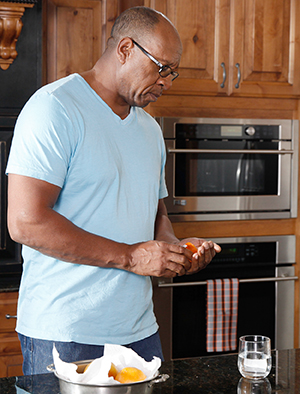Pouchitis is a complication that may occur after having J-pouch surgery. It’s when a pouch made during the surgery becomes red and swollen (inflamed).
J-pouch surgery helps treat conditions like Crohn’s disease and ulcerative colitis. During this procedure, a person’s colon and rectum are removed. A surgeon then replaces the rectum with a manmade pouch. The surgeon makes the pouch from the ileum. The ileum is the last part of the small intestine.
The pouch is shaped like the letter J. It works like the rectum. It holds waste until it leaves the body through the anus. After the surgery, the lining of the pouch may become inflamed. This is pouchitis.
What causes pouchitis?
Experts aren’t quite sure what causes pouchitis. But after J-pouch surgery, bacteria that live in the gut change. The immune system may react to this change. This may cause the inflammation.
You may be at a higher risk of getting pouchitis after J-pouch surgery if you:
-
Have ulcerative colitis
-
Have chronic liver disease
-
Have a viral or bacterial infection
-
Smoke
-
Take nonsteroidal anti-inflammatory drugs (NSAIDs)
-
Are male
-
Have had belly surgery in the past
Symptoms of pouchitis
These are the symptoms of pouchitis:
-
Diarrhea
-
A strong or frequent urge to have a bowel movement
-
Belly cramps
-
Pelvic pain or pressure
-
Fecal incontinence
-
Fever
-
Joint pain
To find out if you have pouchitis, your healthcare provider will ask about your symptoms. You may also need these tests:
-
Blood and stool tests
-
Endoscopy
-
Biopsy
-
Imaging tests such as a CT scan or MRI
Treatment for pouchitis
The main treatment for pouchitis is antibiotics. You will take this medicine for a few weeks. If your symptoms don’t go away or they come back, your healthcare provider may try other antibiotics or different medicines.
If pouchitis lasts for more than 4 weeks, you may have to keep taking the antibiotics or different medicines to control your symptoms. Your healthcare provider may also advise that you:
-
Stop taking NSAIDs such as ibuprofen because these can make pouchitis worse
-
Stop smoking. This can make pouchitis worse.
-
Have surgery to fix any problems that may be causing pouchitis
-
Treat other possible causes of pouchitis, such as an infection
-
Take other medicines as prescribed. Discuss any over-the-counter medicines or probiotics with your provider before taking them.
-
Make some life changes. Losing weight may help. So, too, may eating foods low in carbohydrates or fiber.
When to call your healthcare provider
Call your healthcare provider right away if you have any of these:
-
Fever of 100.4°F (38°C) or higher, or as directed by your provider
-
Belly (abdominal) pain
-
Pain that gets worse
-
Rectal bleeding
-
Symptoms that don’t get better, or get worse
-
New symptoms


